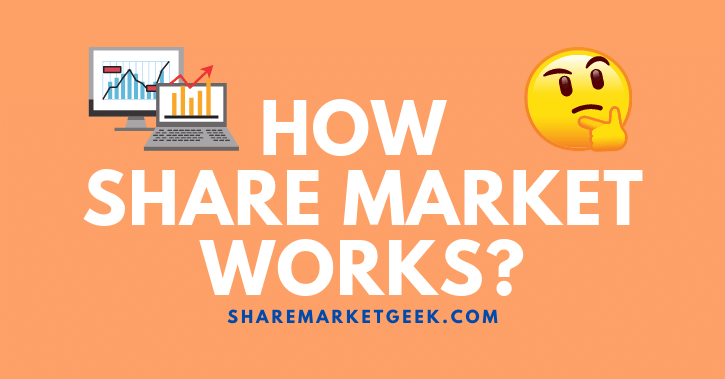In this blog post, we’ll try to explain: How share market works? How are the stock prices determined?
A stock (also known as equity) is a security that represents the ownership of a fraction of a company. These are called publicly traded stocks as certain Companies decided to list their shares to public investors through the Stock Market.
The Stock markets facilitate the sale and purchase of these stocks between individual investors, institutions, and companies.

There are two types of stock markets –
- The Primary Market. The primary market is a market wherein companies issue new securities in order to raise funds. Stocks first become publicly traded through a process known as an Initial Public Offering, or IPO. This initial sale comprises the primary market.
- The Secondary Market. Once the IPO takes place, virtually all subsequent trading of shares takes place between investors. The company itself is not involved. Stock exchanges, such as the National Stock Exchange (NSE), BSE or NASDAQ, facilitate the buying and selling of stocks between investors.
For example, If you want to buy shares of Reliance Industries (NSE: RELIANCE). You need to have a DEMAT with a Broker and hit the “BUY” button through your broker’s website or Mobile App. You are buying shares that another investor has decided to sell. Also, note that you’re NOT buying shares from Reliance Industries itself.
Let’s break down these symbols:
NSE means National Stock Exchange, It is the exchange on which you buy the shares.
RELIANCE is the ticker symbol for the company Reliance Industries Ltd.
Such abbreviations help us to prevent ambiguity and uniquely identify a particular exchange and stock. If you’re new to the Market you can check our post 25 Share Market Terms A Beginner Should Know.
How are the Stock Prices determined? How Share Market Works?
Well, the price of a stock is largely governed by the basic economic principles of supply and demand – plain and simple. Supply is the amount of shares people want to sell, and demand is the amount of shares people want to purchase.
At any given time, there’s a maximum price someone else is willing to pay for buying a certain stock. And, Minimum price someone else is willing to recieve after selling the shares of the stock.
Think of the stock market as an Auction, with some investors bidding for the stocks that other investors are ready to sell. If more people want to buy a stock (demand) than sell it (supply), then the price moves up. And, if more people wanted to sell a stock than buy it, there would be greater supply than demand, and the price would fall.
Predicting the future performance of the company is always taken into consideration by both traders as well as investors. If there is some Bad News regarding the Company, more & more people will want to get rid of its stocks & start selling it. As a result, Price of that particular Company’s Stocks may Fall down.
Conversely, If there’s some Positive News Regarding a Company. People will Want to buy more & more stocks of that Company. As a result, Price of that particular Company’s Stocks may Go Up.
How Share market Goes Up and Down?
Share Market’s Uptrend or downtrend is determined by Overall Uptrend or Downtrend in the Market.
Example If majority of the stocks Listed on the Stock Exchange Move Up, We Can say market is Going Upside. Conversely, If prices of the Majority of the Stocks fall Down, we can say Market is going Downside.
For Example, When Lockdown was announced due to COVID-19, people feared that Businesses will be closed there will be no source of earnings for people and the companies. So people started selling the Stocks they were holding. Since there were more sellers for majority of the Stocks. The Share Market Fell Down.
This is a simple Explanation on How share market works anywhere in the world & How the prices of Stocks Goes Up and Down.

How Share Market goes Up and Down?
Conclusion
I hope now you can explain to someone when they ask you why the share market goes up or down Or How the share market works. The Price of the stocks gets determined in the present because of the Basic principles of Supply & demand and these are guided by future expectations of Investors/Traders from the company.
Happy Investing! Don’t forget to check our other posts on Share Market Basics.
